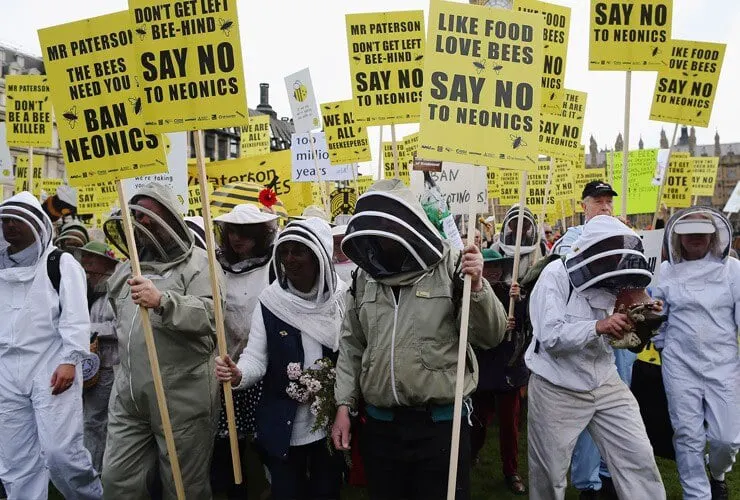Viewpoint: UK decision to rescind neonics pesticide restrictions a welcome win for science
Viewpoint: UK decision to rescind neonics pesticide restrictions a welcome win for science


Nostalgia is fine for their backyard gardens but not agriculture. In the real world of food production, neonics are better for the environment than legacy products that were sprayed everywhere. Instead of being mass spraying, which can lead to runoff and persistence, neonicotinoids are derived from natural mechanisms. They are seed treatments, for when plants are most vulnerable to pests.
In 2018, the EU had placed a ban on neonicotinoids over the objections of scientists, claiming harmful effects on bees, and England played along. There was no evidence for such deaths, honeybees were not in decline, so professional activists had instead claimed wild bees were being harmed. It was a nice, non-specific symptom because it can’t be validated or refuted. There are over 25,000 species of bees, so many we can’t create an accurate number because only a tiny fraction even have hives. Claiming they are dying is as easy as claiming the position of the stars in the sky the month you were born created your personality; only gullible people and those selling to them believe it.

Meanwhile, the UK had decided to save itself $10 billion each year by disentangling from the EU, which means they no longer had to keep themselves opposed to the science the EU disregards. That is a welcome switch from the country that pioneered “Frankenfood” hysteria about the GMO process and rejuvenated anti-vaccine sentiment with the modern myth that they caused autism. Yet they were not alone. Belgium, Denmark, Spain and France and half a dozen others had already disregarded the EU’s centralized wishful thinking. The UK is ignoring people who ignore science, and that is a good thing.
The Guardian, a reliable progressive outlet which has a suspicious financial relationship with organic industry trade groups (donations get made, op-eds by professional deniers for hire like US Right To Know suddenly appear), predictably opposes science yet again, but the virus yellows disease is wrecking crops without good pesticides like thiamethoxam. Guardian ignores the 80 percent losses and claims that refined sugar is bad anyway – they argue that English farmers should go bankrupt because some shady epidemiologist did a food frequency questionnaire and created a correlation. It’s all nonsense, and fortunately European governments are siding with science instead.
Hank Campbell is the founder of Science 2.0 and co-author of the book Science Left Behind. Follow him on Twitter @HankCampbell
A version of this article was originally posted at Science 2.0 and has been reposted here with permission. Science 2.0 can be found on Twitter @Science2_0

 | Videos | More... |

Video: Nuclear energy will destroy us? Global warming is an existential threat? Chemicals are massacring bees? Donate to the Green Industrial Complex!
 | Bees & Pollinators | More... |

GLP podcast: Science journalism is a mess. Here’s how to fix it

Mosquito massacre: Can we safely tackle malaria with a CRISPR gene drive?

Are we facing an ‘Insect Apocalypse’ caused by ‘intensive, industrial’ farming and agricultural chemicals? The media say yes; Science says ‘no’
 | Infographics | More... |

Infographic: Global regulatory and health research agencies on whether glyphosate causes cancer
 | GMO FAQs | More... |

Why is there controversy over GMO foods but not GMO drugs?

How are GMOs labeled around the world?

How does genetic engineering differ from conventional breeding?
 | GLP Profiles | More... |

Alex Jones: Right-wing conspiracy theorist stokes fear of GMOs, pesticides to sell ‘health supplements’




 Trust issues: What happens when therapists use ChatGPT?
Trust issues: What happens when therapists use ChatGPT? Fighting deforestation with CO2: Biotechnology breakthrough creates sustainable palm oil alternative for cosmetics
Fighting deforestation with CO2: Biotechnology breakthrough creates sustainable palm oil alternative for cosmetics California, Washington, Oregon forge immunization alliance to safeguard vaccine access against federal undermining
California, Washington, Oregon forge immunization alliance to safeguard vaccine access against federal undermining Viewpoint — Fact checking MAHA mythmakers: How wellness influencers and RFK, Jr. undermine American science and health
Viewpoint — Fact checking MAHA mythmakers: How wellness influencers and RFK, Jr. undermine American science and health 30-year-old tomato line shows genetic resistance to devastating virus
30-year-old tomato line shows genetic resistance to devastating virus Viewpoint: Video — Big Solar is gobbling up productive agricultural land and hurting farmers yet providing little energy or sustainabilty gains
Viewpoint: Video — Big Solar is gobbling up productive agricultural land and hurting farmers yet providing little energy or sustainabilty gains The free-range chicken dilemma: Better for birds, but with substantial costs
The free-range chicken dilemma: Better for birds, but with substantial costs ‘You have to treat the brain first’: Rethinking chronic pain with Sanjay Gupta
‘You have to treat the brain first’: Rethinking chronic pain with Sanjay Gupta
